 Global corporations have traditionally used political conventions as an opportunity to engage and connect with decision makers, political stakeholders and key opinion leaders to promote their business interests, and this year is proving no different. What is different, however, is how they are choosing to engage. It’s not just about glad-handing and bending the ears of Members of Congress at cocktail parties and receptions; it is about finding new ways to spread their influence beyond the physical confines of the Convention venues to reach a broader and larger audience.
Global corporations have traditionally used political conventions as an opportunity to engage and connect with decision makers, political stakeholders and key opinion leaders to promote their business interests, and this year is proving no different. What is different, however, is how they are choosing to engage. It’s not just about glad-handing and bending the ears of Members of Congress at cocktail parties and receptions; it is about finding new ways to spread their influence beyond the physical confines of the Convention venues to reach a broader and larger audience.
In fact, they are embracing the GOP’s theme for the 2012 Convention — a “Convention Without Walls” — complete with a host of new mobile apps designed to enhance the convention experience not only for those attending, but also for anyone interested in following it from afar.
So how are global corporations successfully breaking through during the convention to ensure their business interests are heard?
- Showcasing policy and thought leadership. Opportunities to insert positions on issues into party platform committees or raise issues at industry- sponsored roundtables and forums are prime examples of channels available to showcase a corporation’s policy and thought leadership. The energy industry leveraged key relationships with the media to provide a forum to discuss the future of U.S. energy policy. On August 27, 2012, Washington Post Live convened energy leaders from industry, advocacy, government, and academia at the Republican National Convention for a breakfast discussion forum. An audience of policy stakeholders heard expert analysis and their approach to energy policy, its relationship to the economy, and the path to an energy-secure future. What differentiated this event from other thought leadership forums at previous conventions was the use of a Twitter hashtag, #RNCEnergy, for Tweets about the event thereby allowing interested parties to search for the hashtag and review key highlights, reactions and talking points from the event.
- Seizing media opportunities. For better or worse, the world still pays attention to the conventions. The media presence in Tampa is more than 15,000 strong and includes journalists from the U.S. and abroad, from traditional and new media. They cover and report on the stories, events and happenings at the convention to an audience of millions of people worldwide. Throughout the convention week, there are an array of opportunities for business leaders to have a visible presence, which can be as micro targeted or as robust as desired. As the week unfolds, industries and companies will emerge as dominant players in shaping the narrative for their issues going forward.
- Listening to the chatter. As some corporations and industries are aggressively pursuing opportunities to showcase their point of view on policy issues, others are actively listening to the chatter from key stakeholders who impact their ability to operate their business. Health care reform is a topic that is creating buzz at the convention from business leaders from a variety of industries who are closely following Governor Romney’s stance on repealing the Affordable Care Act (e.g. ObamaCare). Just last week on his second quarter earnings call, CEO and Founder of Papa John’s Pizza, said that ObamaCare would raise pizza prices 11 to 14 cents. “We’re not supportive of ObamaCare,” Schnatter also said. While his comments caused a social media storm, his point of view is shared by business leaders at the convention who are watching and listening for developments on the issue and preparing to adjust their business models accordingly. A government affairs director for a health care industry association said “We’re waiting to hear more about how Romney is going to stop the health care law changes that are set to go into effect in 2014. Hopefully he addresses this in his speech.”
This intersection of business and politics that provides the platform for corporations to advance their overall reputation, create a fertile environment to do business and stake out thought leadership positions on critical issues of the day.


